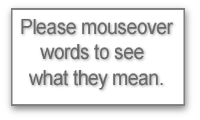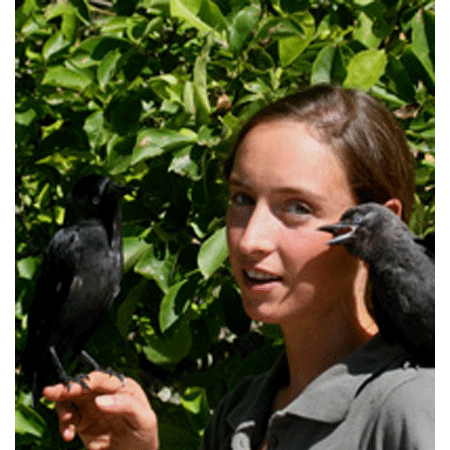Science news
2-Apr-2009 16.00 GMT
Don't play poker with these birds
We all know that people do things differently when someone is looking at them. Now a new study reported online in Current Biology shows that jackdaws also behave like this.
These intelligent birds are closely related to crows and ravens. They have eyes similar to human eyes, says Auguste von Bayern, formerly of the University of Cambridge and now at the University of Oxford. "Jackdaws seem to recognise the eye's role in visual perception, or at the very least they are extremely sensitive to the way that human eyes are oriented."
Cagey crows
When offered tasty food, hand-raised jackdaws took longer to accept it when a person' s eyes were looking towards the food than when they were looking away, say the researchers. The birds hesitated, the researchers suggest, because the person was unfamiliar and so possibly threatening.
 The birds were also able to interpret human gestures to help them find
hidden food. These included change of gaze and pointing. But the researchers found that the birds could not use static
cues, such as eye gaze or head orientation.
The birds were also able to interpret human gestures to help them find
hidden food. These included change of gaze and pointing. But the researchers found that the birds could not use static
cues, such as eye gaze or head orientation.
The researchers suggest that jackdaws are sensitive to human eyes because, just like humans, they use their eyes for communication.
Dogs and chimps
Unlike most birds, jackdaws' eyes have a dark pupil surrounded by a silvery white iris. The hand-raised birds used in the study may be even better than wild jackdaws at paying attention to human gaze and responding to the gestures of the people who raised them.
The findings are particularly interesting, von Bayern says, since most other species studied so far - including our closest relative, the chimpanzee, and man's best friend, the dog - are not particularly sensitive to eye orientation or eye gaze.
Chimps and dogs seem to rely on other cues, such as head or body orientation, in figuring out the looking direction of others. They don't seem to realise that the eyes are the visual organs.
Smart birds
The results suggest that birds in general and the crow family in particular deserve more respect for their mental abilities.
"We may have underestimated the psychological realms of birds," von Bayern says. "Jackdaws, amongst many other birds, form pair bonds for life and need to closely coordinate and collaborate with their partner.
"This requires an efficient way of communicating and sensitivity to their partner's perspective."
The research team was led by Nathan J. Emery, of University of Cambridge and Queen Mary College, University of London. von Bayern et al.: “Report: Jackdaws Respond to Human Attentional States and Communicative Cues in Different Contexts.” Publishing in Current Biology 19, 1–5, April 14, 2009. DOI 10.1016/j.cub.2009.02.062 www.current-biology.com
More help with words
| signal | permanent | individual | breed | fertile | relationship |
What's it all about?
- We all know what?
- What has this new study shown?
- Jackdaws are closely related to which other birds?
- Which part of their body is like that of humans?
- Auguste says that jackdaws seem to know that eyes are used for seeing. What more complicated phrase does she use to say this?
- In the experiment what were the jackdaws offered?
- When did they take longer to accept it?
- Did the jackdaws know the person who was looking at the food?
- What word gave you the answer to the last question?
- Give one example of a clue from the human that the birds could use to find hidden food.
- Give one example of a clue from the human that the birds could not use to find hidden food.
- What was the important difference between these two types of clue? (Hint: there is one word in this paragraph that gives you he answer.)
- The researchers suggest a reason that jackdaws are sensitive to eyes in general. What is it?
- Why can't we assume that the experiment would give the same results with wild jackdaws?
- In your own words what makes these findings especially interesting?
- What did these birds seem to realise that apes and dogs don't?
- What does this mean about what's going on in birds' minds?
- What does the fact that birds often form pair bonds for life have to do with the results of this experiment?
- Imagine you are part of the research team. Think of one question you would still like to answer about all this.
- How would you make a start in trying to find an answer to that question?

